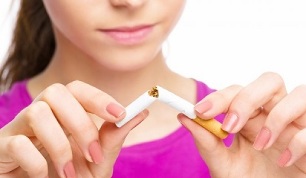
In the process of quitting bad habits, the main thing is not to overdo it with goal setting and goal realization. Very few can quit smoking here now for all eternity. This is a long-term process with his own bribes and experiences. All of these are related to emotional, psychological and physiological characteristics. You can quit smoking on your own, but you have to do it right, rightly, little by little.
Let's try to find out all the differences in this important but not easy thing. Experts have developed a formula for success for a person who is addicted, in the form of a calendar or graphic with a detailed description of the changes taking place in the body. I wonder what happens to the body when you quit smoking. Let's try to find out.
Important: the consequences for the body every day
During the transition to a healthy lifestyle, significant clinical changes occur in the body of adults (heavy smokers), emotional background and physiological conditions change. Each new day quitting smoking is different from the previous one with a background of psychological problems and physical well-being. As they say, the main thing at the moment is not to break. Therefore, let us show an overview of what is happening in the form of a diary, in which a number of calendar days are observed and given with descriptions of current symptoms.
Quit Smoking: First Day
When, in the end, the decision to quit smoking has been finally made and irrevocable (though not for the first time), it is necessary to "enter" this process gradually. To facilitate the transition from an unhealthy lifestyle to a healthy lifestyle, it is important to know how the body will behave. On the first day of the "course" of a healthy lifestyle, the weak body needs to get used to the new regime and begin the recovery process. A sudden transition from one state to another can affect the overall well-being and reduce the resolution. This is not only a physical test but also a psychological one.
The main thing that happens to the body when you quit smoking: the amount of carbon monoxide decreases, red blood cell transport improves, and more oxygen enters the tissues. Although outwardly, on the first day after quitting nicotine, the smoker's "former" enjoyed a new state for himself, he was more active, cheerful, confident in his own strength. The ability to let go of the habit of smoking painlessly on the first day of the course convinces the determined smoker, in the presence of will. And this is important in overcoming nicotine cravings.
However, do not forget that on the first day, changes in physiological characteristics begin in the body.
For example, what happens in a woman's body:
- a little dizzy,
- less appetite,
- weakness,
- anxiety,
- sleep disorders,
- insomnia.

What is the reason? An experienced smoker puts his body to the test at the emotional-psychological level and at the physiological level. Such a profound process triggers that the body “cannot live” without nicotine.
Quitting smoking triggers other dramatic changes. Nicotine is not only absorbed into the bloodstream, but begins to affect blood flow. Therefore, it is important to consider that in general, the body needs at least one year to recover from smoking cessation. But for now, back to the diary quit smoking.
Do not forget that on the first day of quitting smoking, changes in physiological characteristics begin in the body, for example, women experience a slight dizziness.
Quit Smoking: Day Two
At this point, assertiveness can leave you a little disappointed - attacks will start to return to normal (at least not for a long time). This is what happens in the male body, for example. During the struggle on an emotional level, the body undergoes no less dramatic changes: the respiratory organs are released from the mucus and sedimentary components, the function of the ciliated epithelium is restored, the condition of the gastrointestinal tract improves, new cells appear in tissues. The changes that occur during this period at the emotional level are manifested in the form of euphoria, emotional joy. But irritation can also appear. It all depends on self-hypnosis and self-discipline. Although sometimes drowsiness can suddenly be replaced by energy. On the second day after quitting smoking, the appetite has not fully recovered (a strange sensation may occur). You may also experience shortness of breath, coughing, and even abdominal pain. During this period, the urge to urinate and difficulty sleeping are more often indicated. If you add nervous tension, for example, due to stress at work, then itching on the skin is desirable.
Quit smoking: third and fourth day
Let's consider further what happens to the body when you quit smoking. A set of factors affect how quickly the body recovers. In particular, general conditions and weakened immunity play a special role. Therefore, the nuances of smoking cessation therapy should be assessed at the cellular level. Everyone has their own supply of internal energy to fight addiction. Therefore, an individual approach is needed. In the process of cleansing, the body gets rid of toxins. Even the cell structure turns into a radical trigger.
This is what happens to the body today:
- recovery of ciliated epithelium in respiratory organ tissue,
- in the pancreas the alkaline fraction rate increases,
- less mucus accumulates in the stomach,
- In general, blood circulation in the heart and brain improves.
Clear smoking refusal begins to appear, peristalsis is normalized. At the same time, the "withdrawal" of former smokers is increasing, which has more psychological implications, anxiety arises. Quitting smoking seems to be “not finding a place for itself”, struggling with long-term habits. Against this background, there is an increase in appetite, "grabbing" sweets. Sometimes the skin begins to peel off and the fingers swell. During a cough, phlegm may appear in the throat.
Quit Smoking: Days Five and Six
In the process of quitting smoking, many people use a special table or calendar for convenience, someone keeps a diary, recording their feelings in detail. This is useful when you need to identify body-related symptoms and changes. The easier it is after a few days, the diary will help you hold on and analyze your mistakes. From the fifth to the seventh day, a former smoker observes the following changes in his body: it can be seen how the microtraum on the skin begins to heal faster; all parts of the respiratory system are restored (and the farthest too); digestion returns to normal; at invisible levels, blood cells are cleared of nicotine.

Usually, the last point in the process of combating the addiction is set on the seventh day, when a person's physical addiction to cigarettes (smoke, odor) disappears. At the same time, there is no psychological discomfort. But do not forget about the possibility of relapse. Disruption does occur. As euphoria passes, nervousness and aggression appear. Sleep problems can also arise again. However, it is important to remember that this is not the first time, the main stage in life - quitting smoking - has been completed successfully and there is no motivation to return to the old life.
In the process of "quitting" smoking, many people use a special desk or calendar for convenience, someone keeps a diary, recording their feelings in detail.
Quit Smoking: Week Two
After a week, Rubicon seems to have passed and now you can live like a non-smoker, calmly engaged in everyday worries. But such things are rare. The body definitely makes a big leap in the first week of quitting smoking. Even so, sometimes external factors (cigarette smoke and even its appearance, for example when smoking nearby) can play a bad joke with a former smoker. Therefore, it is advisable to share about your plans with friends and acquaintances, so that there is no temptation to escape "for the company".
Quickly listen to your body by now, you may have lost your nicotine habit. But this is not the end of the process of recovering from nicotine addiction. You can help yourself by looking at the former smoker’s calendar, seeing the obvious changes in yourself. Apparently, starting the second week, the struggle turned into a purely psychological field. The urge to smoke can arise during stress, sadness, when seeing an active smoker at work. One must learn not to react to external promises such as restoring the past.
What happens at the end of the second week?
For the past 14 days, a former smoker refrained from nicotine addiction. Currently, the following changes in his body can be observed: bronchitis healing and platelet renewal. Although red blood cell renewal has not yet occurred. This may be due to vegetative-vascular manifestations. At the same time, you can see how the skin improves, the yellowish color of the fingers disappears, and the acute cough gradually disappears. The longer the smoker experiences, the longer symptoms will appear.
What happens in the first month of quitting smoking?
On the 30th day of smoking cessation, weight begins to decrease, the upper respiratory tract system is fully recovered, and psychological comfort is felt. At the same time, the mood can be replaced by depression or blues. Here again, as in the first week, it is important not to give up, to survive, because the hardest way to quit smoking has been taken.
What happens from the second month of quitting smoking?
Starting from the second month of the recovery process from nicotine addiction, and the next three to four months, former smokers (this is especially noticeable in women) acquire more pleasant facial features, swelling disappears, gray on the face disappears, and couperose nets. And in the third month, intensive blood vessel recovery occurs in the body. This indicates that the body tone eventually returns to normal, as does the fact that the "point does not return" finally passes. The physical craving for tobacco has weakened so that one can calmly see another smoker next to him, without suffering torture. In general, there is a significant increase in emotional, psychological and physical levels. Good appetite is no longer a sign of stress seizures, but only related to well-being.
What happens in the first year after quitting smoking?
Now let's see what happens to the body when you quit smoking in the long run. Six months is an important milestone. At this stage of life, doctors observe a complete renewal of all body systems, when blood and cells almost completely eliminate the toxic substance (nicotine). It seems that every new day becomes easier to breathe. The lungs actually work more efficiently. A year has been a real experience for former smokers. This is the period in which the first serious outcome can be inferred. For example, you can congratulate yourself at the end of a successful event and just enjoy a nicotine-free life, which is sure to bear fruit. Those who quit smoking reduced their risk of heart attack and stroke by 30-50 percent; lung cancer - as much as 80 percent; problems with the gastrointestinal tract - as much as 70 percent.
Desire, or alternative
Many people who quit smoking have a misconception about how easy it is to achieve a goal by replacing one habit with another. But any psychoactive substance arouses the craving for another addiction. Someone turns to a light cigarette, someone continues to smoke a pack of cigarettes, only removing it in a timely manner. Of course, smokers with twenty years of experience can feel more difficult than others. In this case, quitting smoking is cyclical, not sudden. However, only one person can free himself from freedom, by releasing only one habit.























